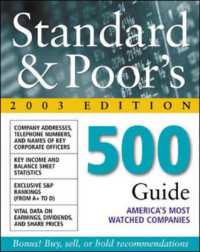- ホーム
- > 洋書
- > 英文書
- > Politics / International Relations
Full Description
While counterterrorism has been the primary focus of the defence and security policies of major Western countries in the last two decades, recent years have seen the re-emergence of states as the major threat. Intelligence Cooperation under Multipolarity offers a timely analysis of the challenges and opportunities for intelligence cooperation, characterized by the re-emergence of great power competition, particularly between the United States, China, and Russia.
This collection explores foreign policy and national security tools and partnerships that have emerged as the United States, typically an international leader, experiences internal and external shocks that have rendered its role on the international stage more uncertain. The book focuses on non-American perspectives in order to understand how America's allies and partners have adjusted to global power transitions. Drawing on contributions from leading intelligence and strategic studies scholars and professionals, Intelligence Cooperation under Multipolarity aims to broaden and deepen our understanding of the consequences of the power transition on national security policies.
Contents
Introduction
1. Intelligence Adaption from the Cold War to the Resurgence of Great Power Politics
Damien van Puyvelde
2. Intelligence Demands Linked to European Autonomy in Trade, Technology, and Security
Björn Fägersten
3. Transatlantic Intelligence Sharing and Cooperation: Existing Challenges and Opportunities
Adriana Seagle
4. Don't Hold Back: Canadianize
Thomas Juneau and Stephanie Carvin
5. Intelligence Cooperation in Historical Perspective: From Cold War Bipolarity to the Multipolar Present
Reg Whitaker
6. Australia's National Intelligence Community: Challenges and Opportunities in a Multi-Polar World
Patrick F. Walsh
7. Enhancing ISR and Intelligence Cooperation under Great Power Competition: The Paradox of Pursuing Strategic Advantage and Strategic Stability
Nancy Teeple
8. In Search for Trust: Challenges in UN Peacekeeping-Intelligence
Sarah-Myriam Martin-Brûlé
Conclusion
Daniel Jean








